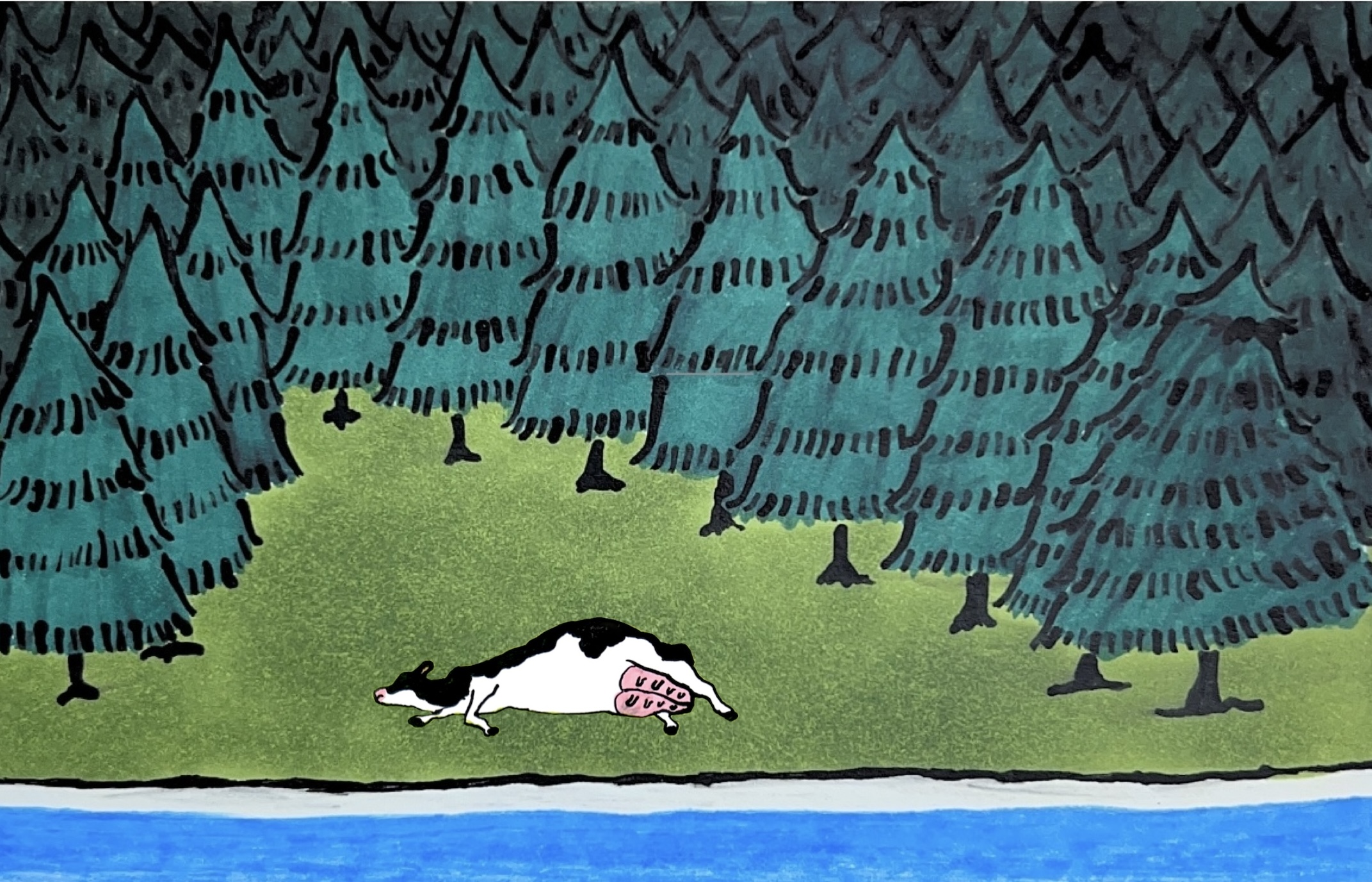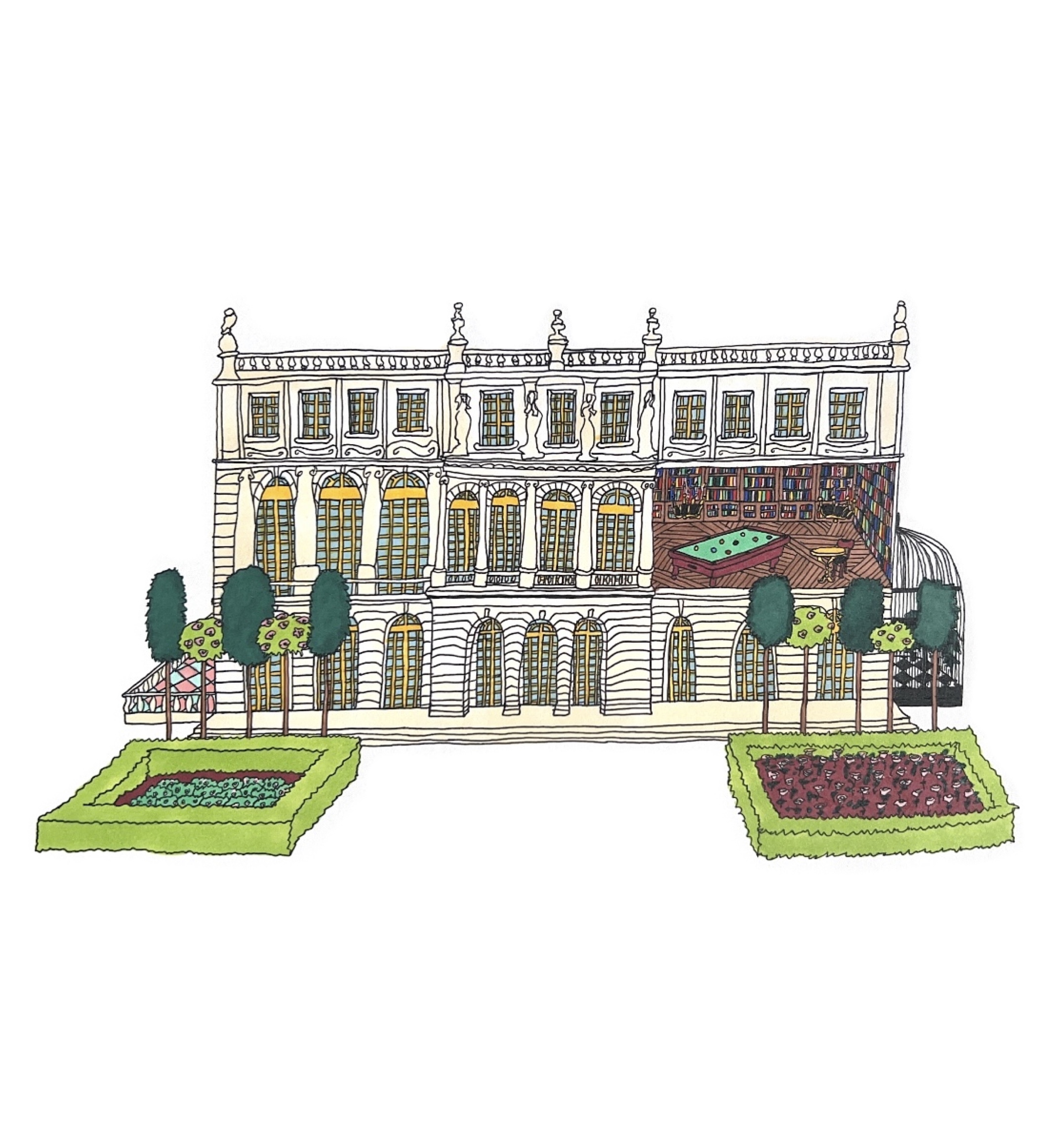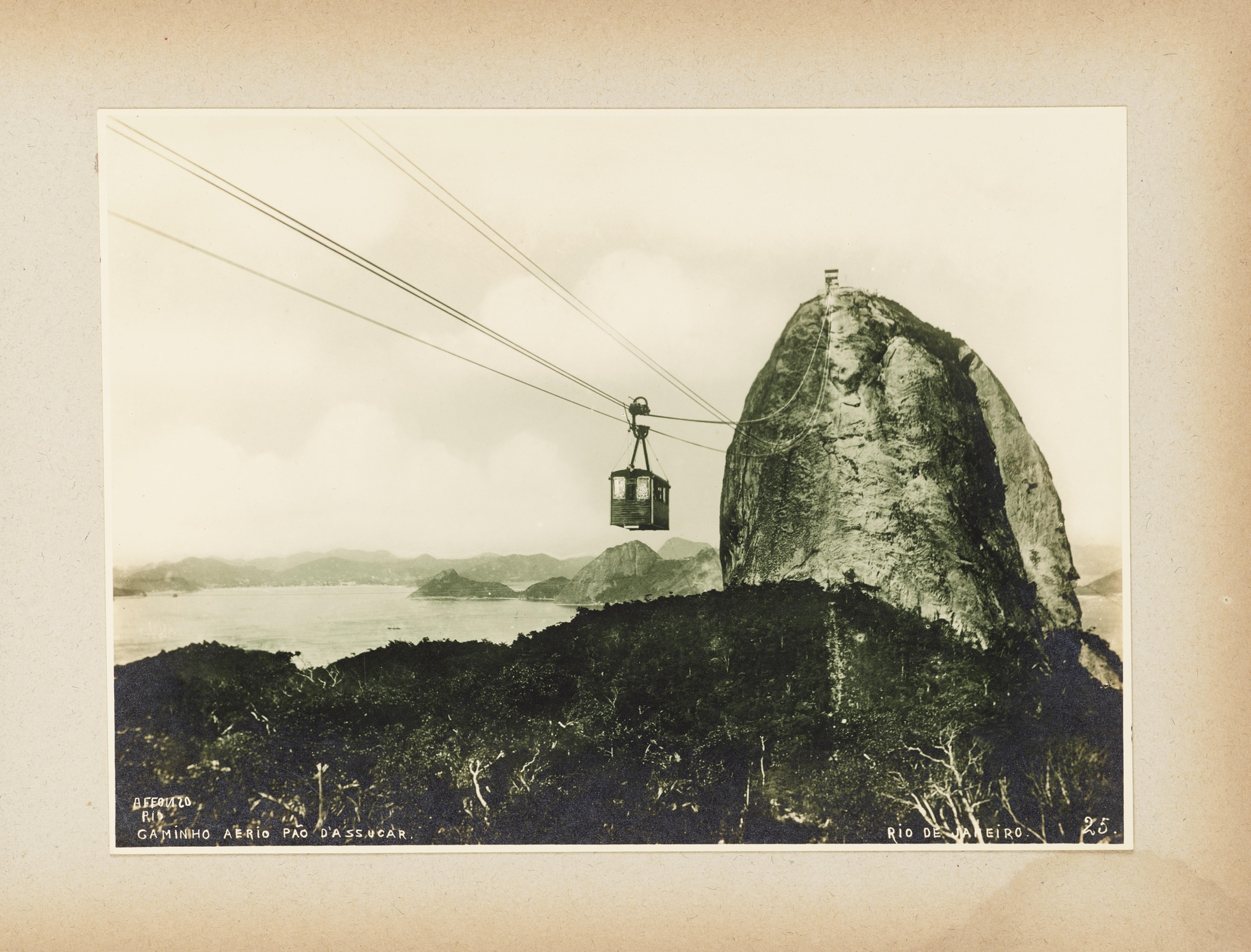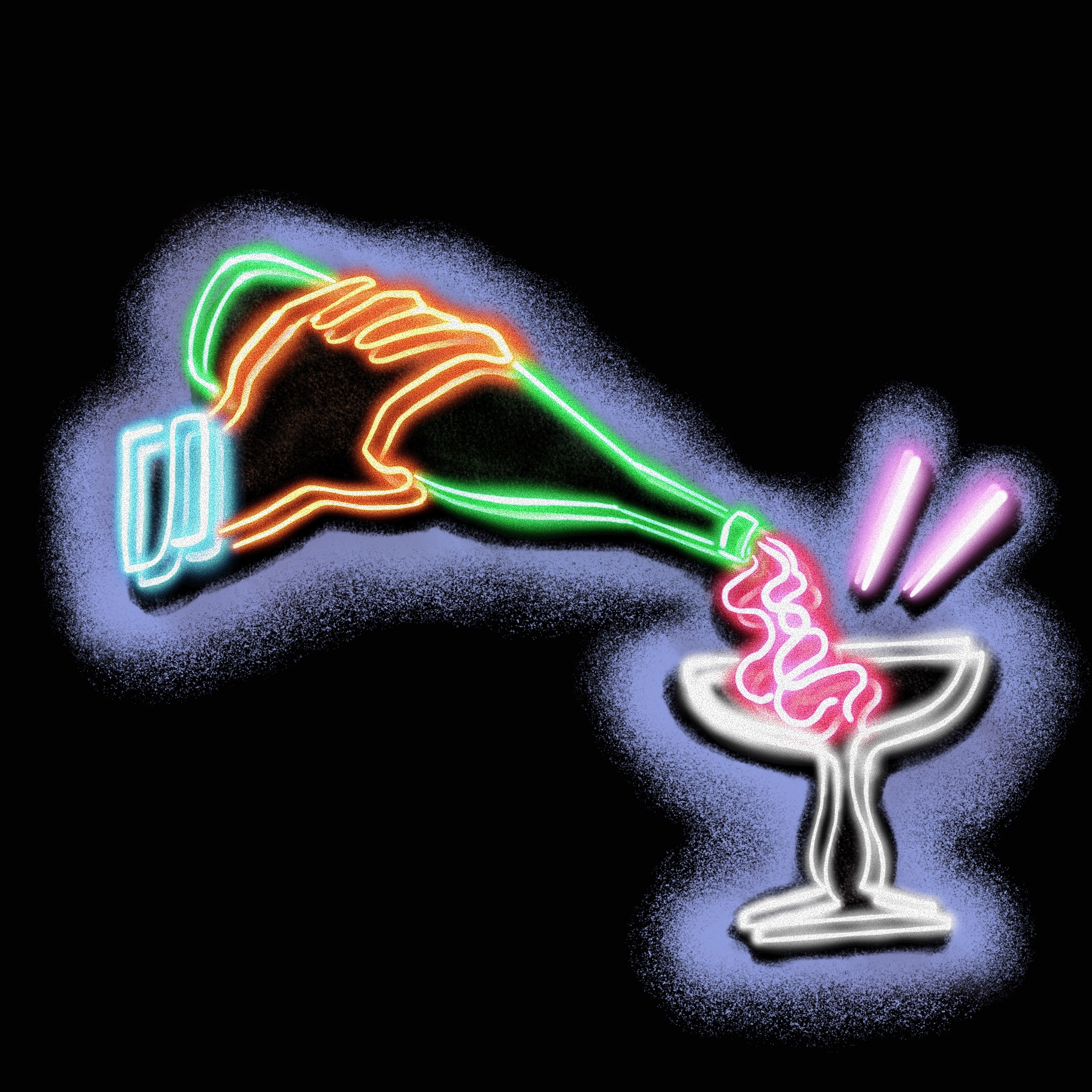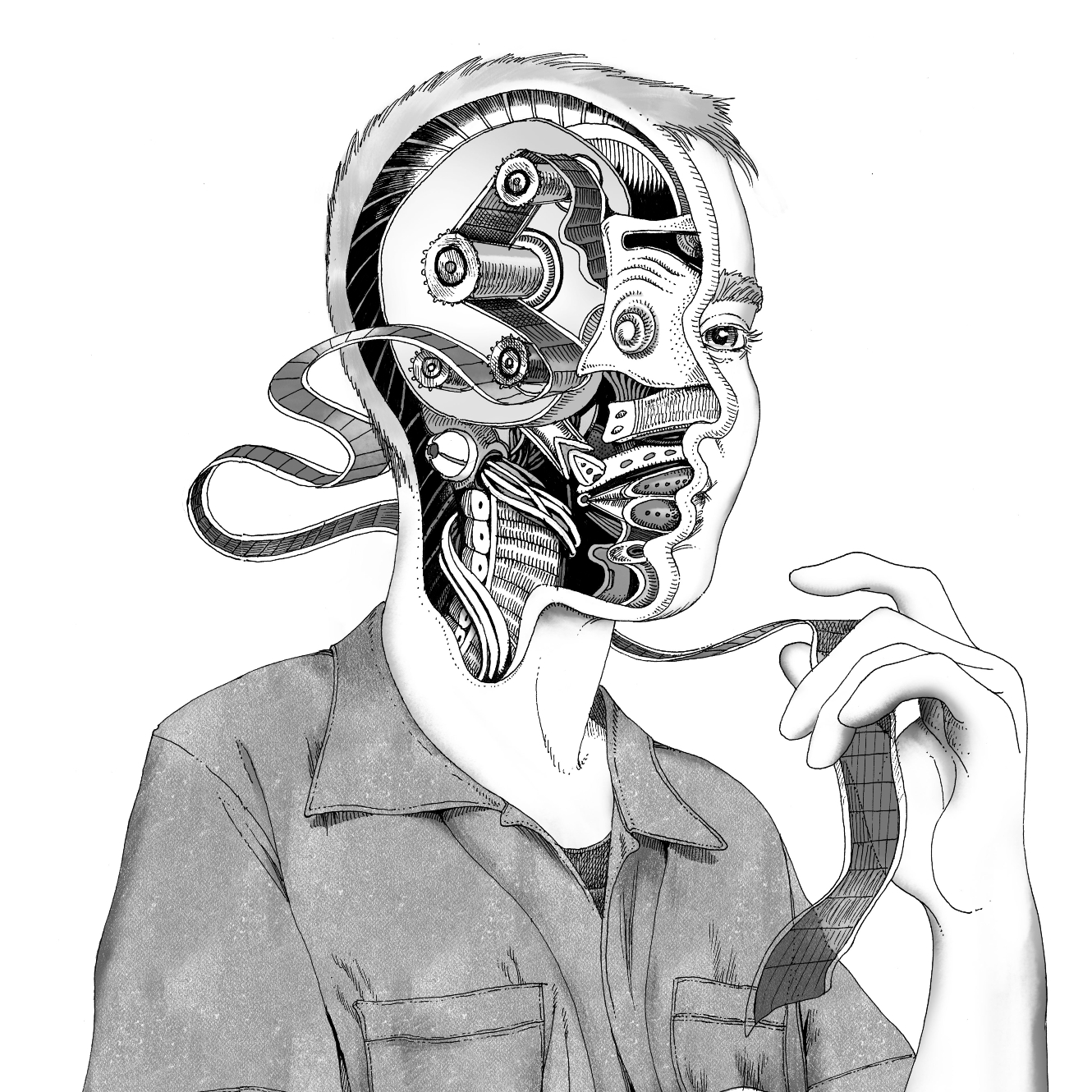[drop-cap]
In an aspen forest trees are molting, more dead than alive and shedding where they should remain shrouded. Dandelions close as dark comes and the bees go. Most of the trees are dying, the soil too dry to nourish roots and the beetles hollowing the trunks multiplying. Once, you ran down to the stream in this forest and found a cow lying bloated and belly sideways on the bank. You didn’t scream, just grabbed your nose and stared at the huge animal, your tiny feet stamping up and down with nerves. Now the riverbank is ashen soil. Fires that ravaged the forests came and were forgotten, came and were forgotten, came and will come and be forgotten again. You walk through the forest and watch the sun die behind the already dead trees. How did we come to this place where it seems it must be you or the land? Clear as the aspens yellow in the last sun: you or the land or you or the land or you or the land or you.
Outside the darkness is absolute while inside the students are talking about the pretentiousness of angels. They’re right, you think, about the pretense of purity or perhaps the pretense of salvation. It’s a creative writing class and, because of this, the pretentious angels live as an image in one of their stories, live as just that. If this were literary journalism or nonfiction you would talk about the historical and cultural contexts of that image, but instead you’re talking about the rhyme “starlings’ wings,” the way it feels coming out of their mouths when spoken, and the kids are smiling. They’re eighteen and nineteen, university students you’ve been teaching on and off for the past few years. All of them bright, kind. And talking now about another story one has written, in which a woman leaps from the top of a building in an attempt to join the birds she loves. Now about a girl one likes, how they trace one another’s hands on their lunch breaks and how she cannot look her in the eye because it makes her feel molten down below. Another laughs and changes the subject to the photographs he has taken on his camera, photographs of houses leveled to ash by the recent fire blazing through his parents’ neighborhood, and another types his thoughts and feelings into ChatGPT and asks it for a neat summary. Clock says class is done, so you say goodbye, the students going off into that absolute darkness, and you standing alone by the window, watching them. “I’ll see you soon,” you tell each of them as they wave thank you and you force your mind not to follow them out into the night, wherever they’re going next and then next, again. They are the same age as your brother when he died of a fentanyl overdose—nineteen. You see him sometimes in their eyes, and then you clutch the table. But. But most of the time you don’t. You just see them. The next week, a boy in your class runs late and walks three steps ahead of you across the university grounds, rushing to arrive at an empty room, his gait awkward and his pants too short for his legs, bunching below his knees, above his ankles. Your eyes begin to wet. In an argument in a faculty meeting, you tell a colleague the kids should all be allowed to use AI because the future is just a matter of time. “The students can hardly sound out words, can hardly read half the time,” he says. “One-fifth of the population of the United States is illiterate,” he says. “What happens when we run out of language to feed artificial intelligence? When all that’s left of human writing to index is the distant past?” You look at him, who is flabbergasted, incredulous. “My students,” you say, “they think even the angels’ salvation has been commodified.” He rolls his eyes. “Salvation has always been a commodity,” he replies.
Someone you used to admire believes in progress with a capital P because he has been born into the wealth necessary to invest in Progress’s belief. Someone you now love positions three people holding buckets around a room, ropes strung in between, and uses a cello bow to play the ropes. At the end of the world, there will be music. Late in a bar in Chicago, a man you do not know, who was once a boy you did, describes his mother leaving his father. “I’m sorry,” you say, “that must have been difficult.” “It wasn’t difficult,” he replies, “it was just painful.” You spend the years after categorizing everything that takes place through that distinction. Difficult. Painful. Those who believe in Progress are the same ones who believe in History. They are building the Future in record speed! They’ll be feasting on Mars before they have to leave there, too. Will it have been difficult or will it have been painful? Or will that distinction have been rendered moot?
You looked young for a long time and then, all at once, the years seemed to catch up with you. You can, if you want, pay to wipe away the time. You wonder if this is not a kind of death. From what you understand of life, it is a combination of space and time. Pulling back the face, shaving the nose, tightening the skin, erasing wrinkles, what the doctors are commodifying is a pausing of space and time. You wonder at the ways this mimics death, not life. People want to live forever, but to what end? If life is defined by space and time, change, then it is not life they want forever. They want to freeze space, freeze time. Die in perpetuity. “Makes sense,” Freud would say.
A room of students is asked to write a prompt about language and wordlessness. One girl raises her hand. “This morning,” she says, “I was thinking about the wind, how it can only be seen through that which it moves, otherwise, it’s invisible.” Outside the room helicopter blades blare and a willow flickers. “Our consciousnesses might be like the wind, only seen through what they move. Words might be one thing that they move to become visible, but not the only thing.” Another girl gets up to use the bathroom. “How we move another is language, with or without words. How we move the world beyond us is also, then, language. What we do to our body, to the world, perhaps this is the truest language of our consciousnesses, not words.” Another boy raises his hand. “I disagree,” he says. The class laughs.
“You can pay to have whatever face you want, whatever body you want,” a woman with dyed blonde hair and designer boots says outside of a bar. “The commodification of women’s sexuality, physicality, is a mechanism of surveillance, of distraction. Perfect your appearance while the world goes up in flames!” Her eyeliner has smeared beneath her lash lines. “If we live in an attention economy, they found a way to continuously capture feminine attention while rendering it hyper-focused on the individual.” She ashes her cigarette, carrying lipstick smear. Down the way, a man is slouched in a doorway overdosing on heroin. “Hyper-focused on the individual” is the last thing he hears.
On a sign outside your door, or is it in a dream, or is it rolling and rotating inside the head’s conveyor belt: “WHAT IF WE JUST STOPPED.”
As a child, you loved this world. After the bus home from school, you would climb to the top of the knoll crowning the hill beyond your parents’ home where always the leaves seemed green. Memory holds them eternally green, safe from seasons. You’d lie in the grass and watch the sky, how swiftly the clouds careened from one ledge of the trees’ watch to the other. You thought God must be there, stationary in the clouds. On some days, you look around now, and you see barely a thing left worth salvaging. Where the knoll stood now is burnt ground, no trees to hold the expanse of sky or track the march of the clouds. God makes as much sense to you as a word as it does a theory. Some days: all. Others: none.
Years ago, after ending a relationship, you traveled home to the mountains. The road into the town was difficult, curving and straightening like a spine. One road curving in, one road straightening out. You had come to believe in very little except for the human capacity for indifference and will toward destruction. Once you had wanted kids, movement, the world. Once, when the world seemed beyond redemption, you imagined a small child beside you, grasping your hand. And the world then was redeemed. Through the course of the relationship, you had come to believe the only responsible thing to want in this world was nothing. It is quite easy to learn to want nothing. In the mountains, you met a man whom you believed you had met before, though you hadn’t. You could not speak when he spoke to you, only set your stare on the floor and keep it there. He walked in and out of a swinging door, and each time you heard his footsteps, you trained your eyes along the floor. Language seemed to disappear. When he came to speak to you, wordless, you watched only his shoes. What is it about a person that says: I am for you? I am for you. A week later, walking with him through the mountains, tears came like the onslaught of spring melt. The sudden descent of joy from somewhere up high. How strange it is, how the threshold of feeling can be blown radically in either direction in an instant: one instant to realize joy never previously imaginable. One instant, too, to realize sorrow once unfathomable. Funny, the misconception that the two must come hand-in-hand. They don’t. Mostly it seems they go alone.
You have always deferred to the other, whoever the other is. Easier it is to have someone tell you how you feel than to determine how you feel yourself. The last time you had sex, in the relationship before you went back to the mountains, after you said you did not want to, the room was very dark. You did not want to see him. But you felt you owed it to him, all his pressing, his pressing. His thin body, like a suckling baby. From the start, it disturbed you. Not because of how it appeared, but because of how he used it. All the anger and the pain bound up in his body. The body knows. So much anger and pain in that body, it seemed to slow him. Rip words from his mouth before they even had a chance to materialize, make his language tremble and fall. Make him skirt the edge of the room like a shadow. He said he moved by a politics of gentleness, but there was nothing gentle here. Gentleness favors the other. Perhaps it even subjugates oneself in favor of the other. He did not know how to do this. You don’t think he ever learned. One learns it through understanding one’s ego, you think, and its sameness to anyone else’s. The first time you had sex, he shamed both of you. And so, everything began with shame. His ego. You stopped masturbating. You stopped sleeping together. If you have a choice between being subjected to soft power or hard power, you choose the latter. Let power show itself blatantly, to wield it covertly is cowardice. To try to disguise it as gentleness is manipulation. After you had sex that last time in the dark room, you returned to the first room. The first room where you had no say. You could see the outlines of the walls, the ceiling, hear the pigeons and Halal carts on the street below. See the hallways beyond the room, feel the blood warm on your leg. You had not gone back to that room. You hadn’t seen it, heard it, felt the blood, the blood. Smelled the Halal below. After you had sex the last time, you went to the bathroom, where blood went brown in the toilet bowl like feces. This isn’t right, your body said, this isn’t right. And he said, you do not know. You do not know. So he held you still while you tried to run from that first room, hyperventilating from the effort of trying to escape your body. He held you still. You woke up in the morning with eyes infected from the crying, pus and swell. You had to leave. You left. And the last words he sent you, after your parting, after your saying no, “I want you,” he wrote. No, there is nothing gentle there. Nothing gentle in choosing not to listen. The soul shows itself through the other. The violence inherent to desire: “I want you.”
You read new statistics about the crumbling of intimacy. All we can do is try to listen. He says, “I’m sorry,” and you wonder, if they were to put a price on apologies and absolution, which would go for more. Is the gift of an apology that it absolves the person to whom it’s given?
You go back to the mountains where once you ran down to the stream to find a dead cow belly sideways on the bank. As the light goes out from the day, the whole earth shapeshifts miraculously green. Rain has left the trees and grass brighter. A friend walks a few steps before you, smiling. The world seems to go on and on past the mountains, brilliant rolling hills and jutting peaks and the birds ricocheting from earth to branch, the sound of water’s path. He works as a scientist for the forest service, his department facing cuts by the Federal Government. All the land you see in the distance will soon be up for sale, the ricocheting birds and the great expanse and the soil old and new. He walks slowly, steps lightly, careful to avoid disturbing the moss and buds underfoot. Once, in an instant, you realized you could not love a woman as you watched her blaze through a field of cryptobiotic soil. “You’re going to kill the dirt,” you said. “Thank God dirt is already dead,” she replied. You watch your friend step carefully. You mention the wolves’ reintroduction to this region of the country. “The wolves have always been here, even when we believed them extinct,” he says. “They only got better at hiding.” You watch him watch the mountains and cry.
Where is the other world hidden beneath this one? Where are we hiding it beneath words and ego and capital?
Where we are going, it doesn’t seem there is much in the way of salvation. But then again, salvation has always been a commodity.

